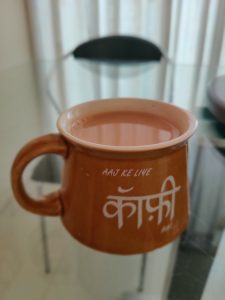
Reena is a new age, smart, educated, working professional. She is particular about everything, from her dress… to her make- up… to her exercise schedule ….to her career plan. This agile, young, healthy girl, Reena is now pregnant. And she is so happy! As she discloses the news to her near and dear ones, she is suddenly bombarded with so many inputs about do’s and don’ts.
Reena believes that being pregnant is a natural event. Then why should her lifestyle go upside down suddenly? Why should there be restrictions on things that she always liked to do for so many years? On the other hand she is a perfectionist…wanting to keep no stone unturned to achieve the “best results”!
She has so many questions and no one can convincingly answer them… neither her Mom or Mom in law not even Google!
Finally, Reena comes to me and she asks:
Is it safe to have coffee during pregnancy?
Here is the answer:
Coffee contains caffeine. While making coffee most people add sugar to the drink. Excessive sugar again is not good. However this article deals with caffeine.
Caffeine is naturally available in coffee beans, tea leaves, some seeds and fruits.
What does caffeine do to my body?
Caffeine is a natural stimulant. It improves alertness. It also increases the heart rate and blood pressure slightly. It makes you pass more urine. It can also increase the heart burn. Alertness in the later part of the day may not allow you to sleep well.
Does excessive consumption harm the baby?
High intake of caffeine can cause pregnancy loss, miscarriages and still births. (1) With every 100 mg of caffeine, the risk of pregnancy loss increases by 7% and that of low birth weight increases by 13%. (4). There is convincing evidence that if you are consuming more than eight cups of coffee per day, it can harm the baby in the womb.
How much caffeine is “OK” for a healthy non pregnant person?
400 mg /day of caffeine is ok. Higher amounts may lead to side effects.
Why should pregnant women consume less caffeine?
During pregnancy the body digests (metabolises) caffeine slowly. The caffeine passes directly to the baby through the placenta. The baby doesn’t have the enzyme to digest (metabolise) the caffeine so it accumulates in the body. This may lead to bad effects on the baby in the womb
How much caffeine is “OK” during pregnancy?
Reputed medical bodies recommend that pregnant women should consume less caffeine. The National health services of the United Kingdom suggest that pregnant woman should consume less than 200 mg of caffeine every day. (1)
The World health Organization recommends that it is advisable to reduce the intake to below 300 mg per day (2)
Is tea better than coffee?
Tea contains less caffeine than coffee.
Here is a comparison:
Coffee: (per cup)
Filter coffee: 100 mg
Instant coffee: 60-100 mg
Decaf: 2 mg
Tea:(per cup)
Black Tea: 50mg
Green Tea: 25mg
Even energy drinks contain caffeine. Cola contains around 25 mg of caffeine.
How to reduce the intake of caffeine?
First estimate the amount of caffeine that you take in a day. Is it really high? If yes, think what is it that attracts you to the cuppa? Is it the smell, the feel, the taste? Is it the few leisure moments or the hot temperature of the drink. Try to replace coffee by other drink. Still not possible?
Here are few tips that can help:
• Use decaf and trick your body.
• Use small cups or take half cup every time.
• Avoid coffee in the later part of the day.
• Consume a lot of water or juices during the day
Conclusion:
Caffeine is not a poison. Medicines used for common cold also have caffeine. Caffeine is used to treat apnoea (when breathing stops) in premature babies.
Most of the reputed medical organizations recommend that use of moderate amounts of coffee (upto 200- 300 mgs) of caffeine is safe during pregnancy.
References:
1. Int J Gynaecol Obstet. 2015 Aug;130(2):116-22. doi: 10.1016/j.ijgo.2015.03.033. Epub 2015 May 14.
2. https://bmcmedicine.biomedcentral.com/articles/10.1186/s12916-014-0174-6. [Online]
3. https://www.nhs.uk/common-health-questions/pregnancy/should-i-limit-caffeine-during-pregnancy/. [Online] [Cited: 2020 april 10.]
4. https://www.who.int/elena/titles/caffeine-pregnancy/en/. [Online] [Cited: 10 april 2020.]